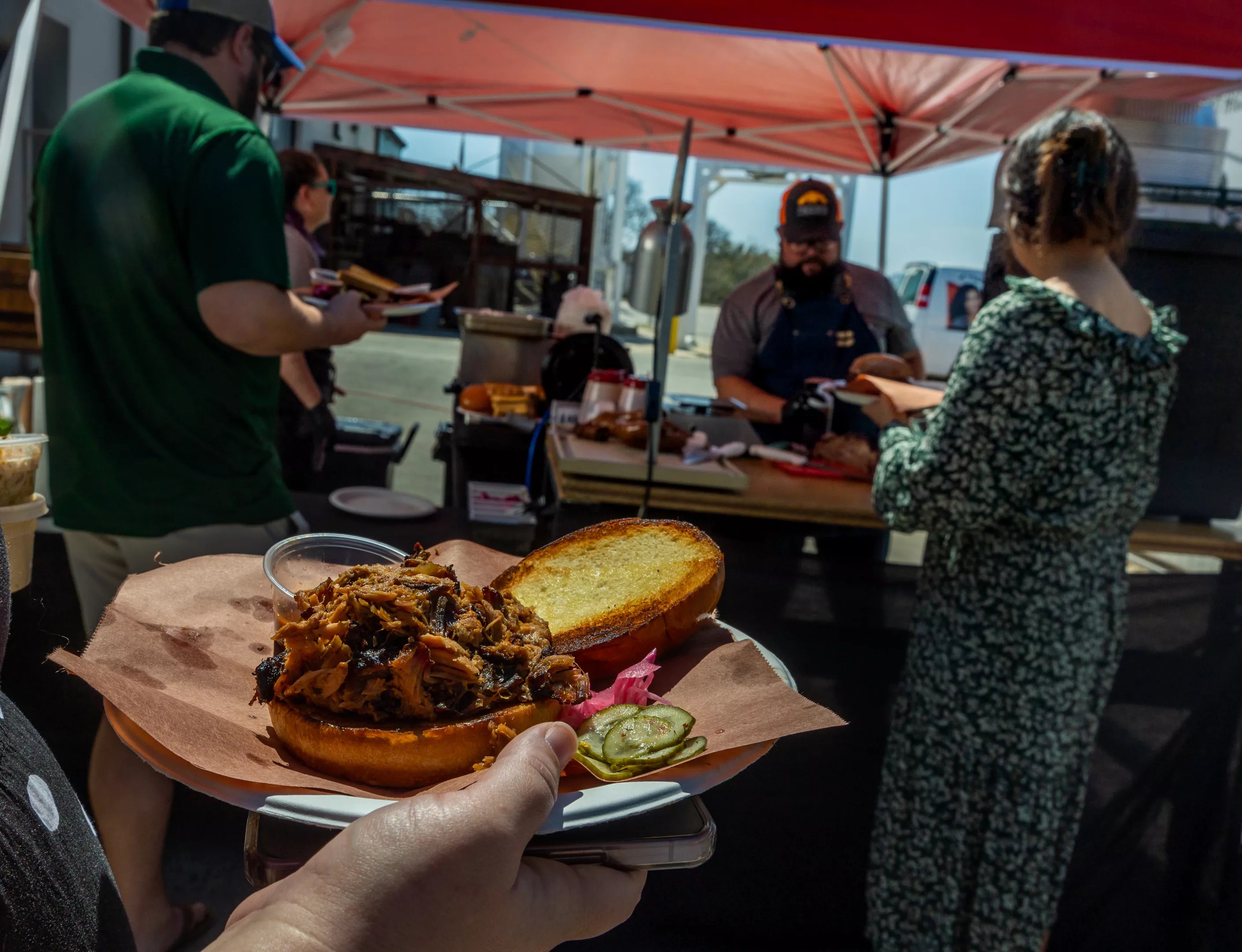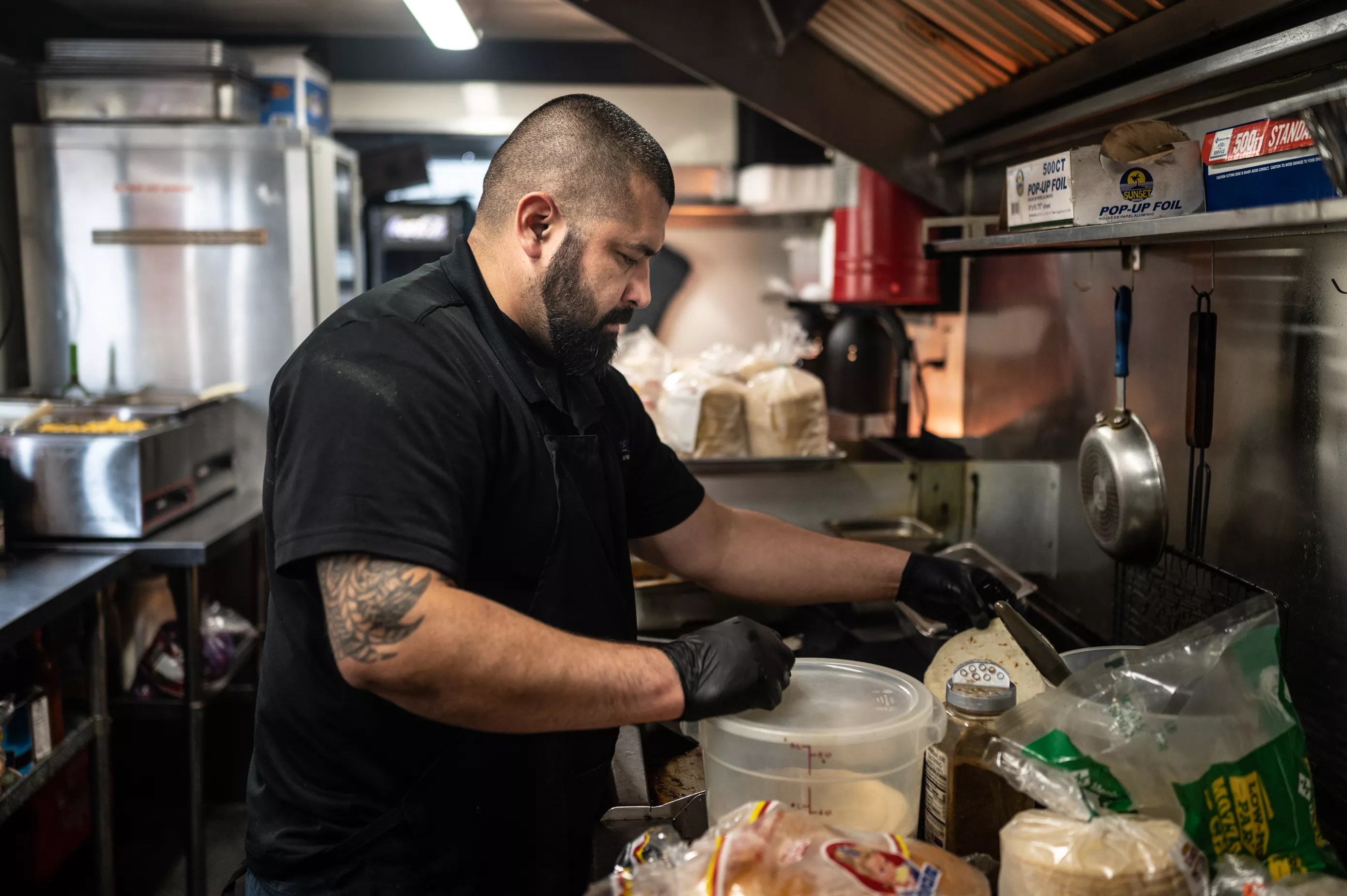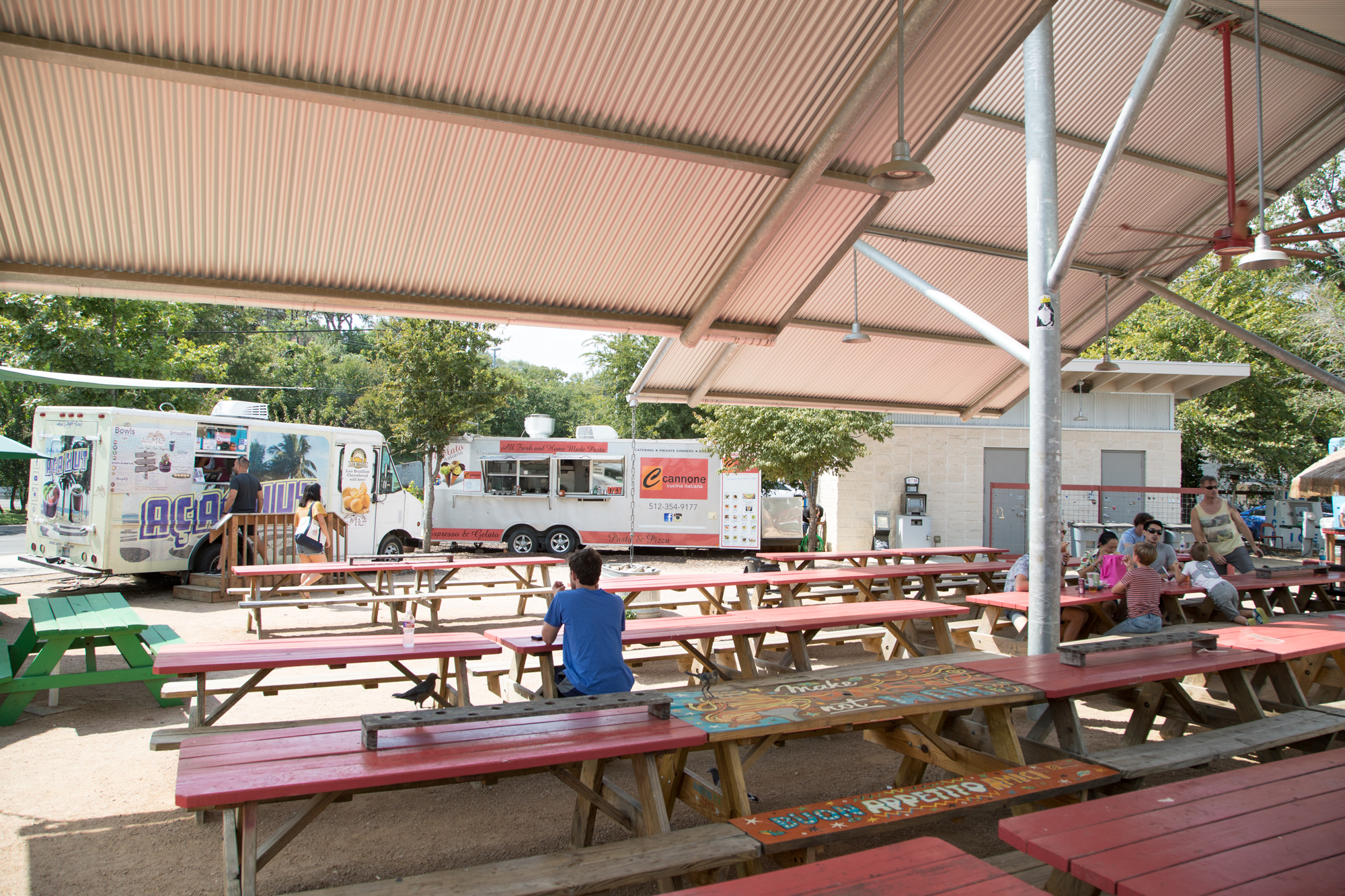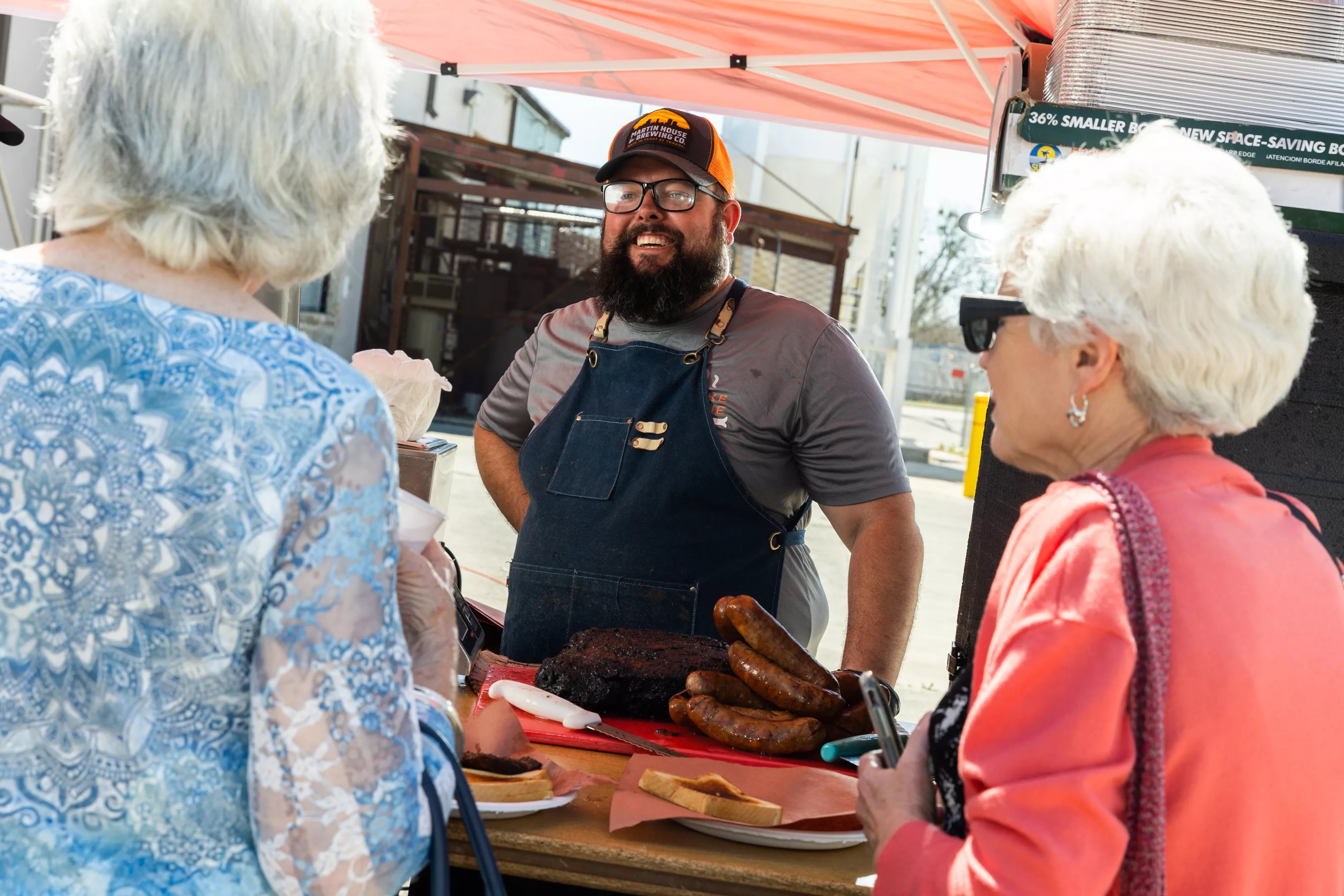
Nathan Hunsinger

Audio By Carbonatix
Chef Ross Marquette and his wife, Katherine, were expecting their first child when they both lost their jobs in 2020. The pandemic dealt a knock-out punch to many in the restaurant industry, and they tumbled with it.
“We have to do this smart,” Ross said of their next steps in those early days of unemployment.
The Marquettes liked the food industry. They’d both made careers in it. They dreamed of starting their own business but were wary of taking on debt in an unpredictable time, so they researched their options.
“We wanted to start operating with as little overhead as possible to see if the business had legs,” he said.
Ross is a trained chef with a resume that includes work at The Heritage Table in Frisco, and he has served as a restaurant consultant. “I’m very aware of how challenging the margins are in the restaurant business,” he said.
He wanted to try a barbecue business and looked into a food truck; used trucks cost around $50,000 to $100,000 but come with the risk of needing costly repairs. A newer food truck with customizations can be as much as $175,000.
That’s why the couple settled on a much more affordable trailer that had a smoker with a canopy. It was a portion of the cost of a food truck but would get the job done. He and his wife could test his concept, Smoke and Bone BBQ, without going six digits into debt.
Their choice paid off. Two years in, he’s booking events, taking catering jobs and feeding hungry drinkers at breweries around North Texas in cities like Garland and Fort Worth.
But you won’t find Smoke and Bone BBQ in Dallas, at least for now.
While mobile food operations in cities like Austin have flourished, Dallas entrepreneurs face regulations that are prohibitive to small business startups. For example, Dallas allows food trucks but not the more affordable trailers, the difference being that a food truck is “motorized” and a trailer is towed. The Marquettes haul their trailer to events and pull meat off the smoker and serve it to tables under a pop-up tent. To do that in Dallas, they’d need a city-issued event permit that would cost them more than $250 per day. Ross said he’d never go to an event that put him that deeply in the hole from the outset.
We reached out to a handful of people with the city for an explanation of why trailers are treated differently but never got an answer. We asked a longtime food truck vendor the same question. They said they too have asked, and the city couldn’t answer.
Some trailers are built with the same features of a food truck. For his 225 BBQ, owner René Ramirez has a fully enclosed trailer that is usually parked outside Division Brewing in Arlington, where he’s established a customer base. He serves tacos, quesadillas, soups, birria and sometimes burgers, all of which are stuffed with brisket. Last year he made Texas Monthly‘s Top 50 honorable mentions list for the best barbecue joints in Texas.

Chef René Ramirez bought an expensive trailer for his business, 225 BBQ, only to find out Dallas only allows trucks.
Mike Brooks
Ramirez bought his trailer for about $50,000. It has two refrigerators, a range and oven, two food warmers, two flat grills, a fryer, a three-well steam table, a three-compartment sink and a hand-washing sink. But unless he pays for a one-day permit for an approved special event, he’s not allowed to operate in Dallas because it’s a trailer he pulls with his truck.
“I didn’t do my research. I learned the hard way,” Ramirez said with a laugh. “I thought it was going to be an easy process, but nope. That’s why we ended up everywhere else besides Dallas.”
After he learned about the restriction, he looked into getting a food truck and learned one would cost upward of $140,000. Allowing only trucks creates a high barrier to entry, stifling entrepreneurship in underserved communities where it’s needed the most.
“You shouldn’t need a lawyer with you at an event to tell you if you’re in compliance or not.” – Krista Nightengale with Better Block Foundation
“This is a basic equity issue,” Dallas City Council member Chad West said in a recent committee meeting on the issue. “You’ve got food trucks that are very expensive to operate. It’s a barrier to entry for these smaller guys because they haven’t had the benefits of this ordinance that the food trucks have had.”
The truck vs. trailer issue isn’t the only rule stifling Dallas entrepreneurs. The city also requires food trucks to visit a food commissary every day. A commissary is a licensed commercial kitchen that is regulated by the health department where food truck operators can prepare, cook and store food and discharge wastewater. Everyone agrees that having access to a commissary is a good thing, but having to go every night is difficult. Vendors can’t stay in one place for any length of time, say, over a weekend. The back and forth is expensive and time-consuming.
Austin’s mobile food scene is an example of how different things can look with less onerous regulations. First, Austin allows trailers and doesn’t distinguish among motorized, pulled or pushed mobile food operations.
Vendors in Austin also have contracts with a commissary, but the city doesn’t regulate their visits. In fact, another business has flourished from this; companies will go to the trailers and trucks to take away wastewater. Also, Austin’s permit for a trailer is less than $300 for an entire year compared with Dallas’ $250 for just one day.

Austin food trucks thrive under fewer regulations, which Dallas may soon match.
VDB photos
Umar Baig has operated Halal Mother Trucker, a mobile food truck, in Dallas for the past five years. He says so long as a truck operator has all of his permits in order, Dallas is a good city to work in, but he does have some qualms, among them how slowly the city’s code department has operated since COVID.
“I think they should let trailers be permitted,” Baig said.” I don’t know why you wouldn’t. That’s very dumb. It’s the same thing as a food truck, but you have a truck pulling it.”
He also wishes there were more parks for trucks and trailers, “like how they do it in Austin.” Dallas is working on that, too.
Terry Mooney is president of the North Texas Food Truck Association and has helped her son operate his truck, Jack’s Chowhound, for more than a decade.
“Everything is very vague with food trucks,” Mooney said. “Rules change, and you don’t know that they change until you go down to renew your permit, and then all of a sudden you’re surprised with some new rule that you weren’t aware of.”
That’s not just in Dallas. Cities throughout North Texas have different rules. She said that recently 30 trucks arrived for an event in Arlington, and 10 had to leave because the operators didn’t know they had to have a gas-line pressure test done before arriving. She doesn’t disagree with the test, but truck operators didn’t know it was necessary.
Instead of trying to maneuver around cities, codes and events, it’s easier to find private catering jobs, she said.
“You find that you just look for private parties and corporate events to keep your life simple instead of dealing with a lot of these different festivals and cities. It just becomes too hard,” Mooney said. “And the inspections and stuff, a lot of times these inspectors will come out and want to inspect your truck, which they should – they need to do that – but they wait until you’ve got a huge line out the door, 300 people in line and they want to come in and inspect your truck.”
Baig sees an opportunity for Dallas to create a better culture around food trucks, but there needs to be more opportunity.
These issues aren’t new. The Observer has been covering the city’s regulation of trucks since at least 2014, and now some City Council members are getting impatient. In November 2020, five city council members signed a letter requesting Mayor Eric Johnson’s office to place an item on the council’s agenda regarding food truck regulations before the end of the year. That didn’t happen.
About a year ago, council member West posted a “call to action” on his Facebook page asking for industry comments on what exactly needed to change that “could allow more food service providers to enter the business and more equitable access to food options throughout the city.”
West isn’t alone in pushing for action. In a committee meeting in January, council member Omar Narvaez said, “We are behind as a city with these [regulations]. We’re decades behind already from other major cities, so let’s see how we can catch up.”
Adam Bazaldua, chair of the council’s Quality of Life, Arts and Culture Committee, is both a City Council member and trained chef who taught a culinary class in Dallas ISD, and even he was puzzled by the delay. “I’m just kind of at a loss for what the wait is for,” Bazaldua said.
Their impatience is understandable. The Institute for Justice, a nonprofit public interest law firm, has been touting the benefits of food trucks for a decade. In a 2012 report, they wrote, “Food trucks give entrepreneurs with big dreams, but only a little capital, a way to start their own food-service businesses. In many instances, trucks serve as a stepping stone toward opening a brick and mortar space.”

Chef Ross Marquette primarily works in Fort Worth and Garland.
Nathan Hunsinger
After a decade of grappling with getting the city’s mobile dining business in gear, the City Council and a nonprofit are finally taking the wheel.
The Better Block Foundation helped answer West’s call to get something done about mobile food vending. Better Block is a local nonprofit that looks for ways to help communities and improve neighborhoods. Last spring it created the MLK Food Park, a pop-up incubator specifically for South Dallas culinary entrepreneurs. For four weeks, on Friday, Saturday and Sunday afternoons, vendors in a variety of mobile formats set up shop in the Forest District neighborhood. It was a success. More than 5,000 people attended.
The purpose of the MLK Food Park was to test what works, what doesn’t and make recommendations to the city. Even it had problems with the types of mobile food vendors allowed and complicated codes.
“You shouldn’t need a lawyer with you at an event to tell you if you’re in compliance or not,” said Krista Nightengale, Better Block’s executive director.
Some codes can’t even be explained, like the one that says mobile food vendors can’t prepare fresh chicken or shrimp; it must be frozen then fried.
Better Block offered a handful of recommendations to the council committee on March 29: The city should clear up its definition of what counts as a “mobile food preparation vehicle” to include anything that “is self-propelled or can be pulled or pushed safely down a sidewalk, street or highway … that complies with health and transportation standards.” It should simplify permitting and allow the preparation of all foods at mobile operations that meet health standards. Finally, the city should reduce the requirement for commissary visits to once per week or as necessary for qualified operators.
Nightengale and Better Block worked directly with Chauncy Williams, the assistant director at Dallas Code Compliance Department. Williams studied the recommendations to make sure they were feasible for city staff to manage.
At the meeting on March 29, Williams reported to the committee that they should move forward with all the suggested changes. The members of the committee unanimously agreed. The next stop is the full City Council.
West said the director of code compliance services, Carl Simpson, was shooting for May for the ordinance to come up for a full council vote.
“I asked him to do his very best to bring it to Council by the last meeting in April, 4/27/22. Fingers crossed that we can meet that deadline,” West wrote in an email.
A separate pilot program for mobile food operators is exploring new vending zones, the public spaces where food trucks can park without having to pay a fee or share revenue with another entity or landowner. This 60-day Mobile Food Vending Zone Pilot Program so far has two proposed spots to begin operating early this summer: Kiest Park in Oak Cliff and City Hall Plaza at 1500 Marilla St.
“Right now, any mobile food vendor has to be tied to a special event permit, be invited by a private property owner or work with an entity that has a special agreement with the city, such as Klyde Warren Park. In a lot of cases, there are fees associated with participating in this way, where the entity will take a portion of sales,” Nightengale said.
She hopes this pilot effort will allow operators to vend in areas that aren’t the typical spots and eventually expand to more neighborhoods. It will allow the city to monitor sanitation, traffic, hand-washing and restroom use as well as what effects the food parks have on nearby restaurants. They would then use that information to determine more public spaces for all types of mobile food vendors.
A robust food truck program goes further than just allowing Dallasites to have more kinds of food to eat. It’s a driver for entrepreneurship and small businesses. A long-term study from Ginette Wessel, a doctoral student at UC Berkeley, found that mobile food units cost $55,000 to $75,000. According to the accounting and tech company Sage, the average cost of starting a new restaurant is $275,000. Mobility allows operators to test different neighborhoods and reach new customer bases that a static location can’t.
“More specifically, rather than pulling labor away from places and economic activities in need of growth, vendors jumpstart commerce through pedestrian activity and spill over effects,” Wessel wrote in her study. “Vendors also contribute to city and county public works, parks and recreation, local economic development, and public health budgets through business taxes and permit fees. Cities with affordable fees can encourage easier entry into the market. Both customers and vendors spend locally, sustaining local commerce and investment.”
“Ultimately, we hope that this is a move toward more access for both the vendors and the community,” Nightengale said.
Any fears that expanding the number of food trucks will hurt existing restaurants are not supported by evidence, according to the Institute for Justice, which looked at 12 years of county-level census data. The opposite is true, the organization wrote in a report titled “Food Truck Truth.”
“Even as food trucks took off following the Great Recession, the restaurant industry continued to grow,” the report stated. Authors Dick Carpenter and Kyle Sweetland also found that the number of food trucks in one year has no effect on the number of restaurants the next year and that food trucks may complement the restaurant industry.
The UC Berkeley report also supported the idea.
“Despite the resistance from brick-and-mortar business owners, mobile food vendors contribute to the economic development of local settings in many ways,” Wessel wrote. “This research, as well as other studies, shows that rather than detracting business from an area, vendors are known to foster commerce in communities.”
The final decision about whether these regulations are updated to revitalize the food truck business in Dallas rests with the City Council. By this summer, it’s possible that we’ll have a new class of mobile food vendors rolling through town.
When Ramirez heard of the proposed changes, he was frustrated that it’s taken so long – “They need to get with the times” – and also hopeful that he might get access to Dallas’ large economy. “I’ve been tempted to get a second truck, so if they push through with it, I might do so,” he said.